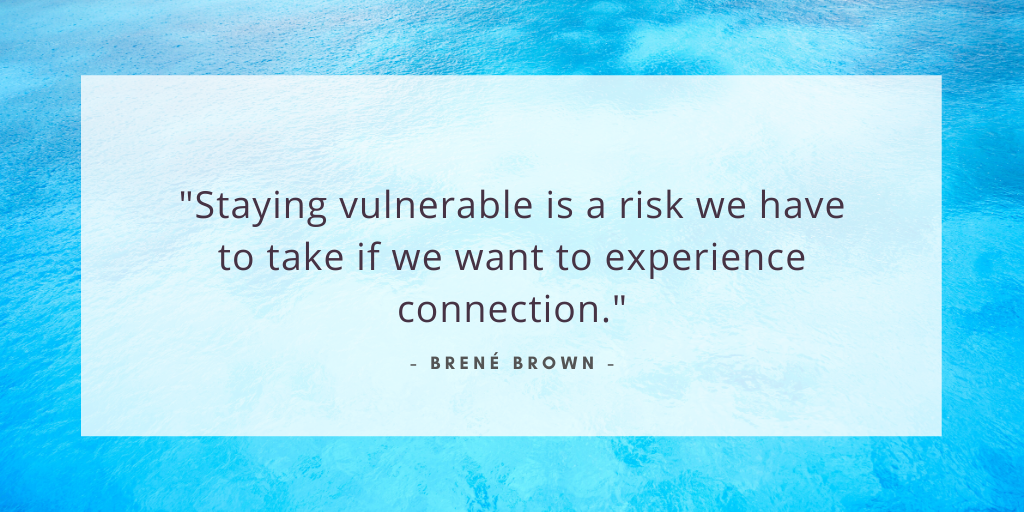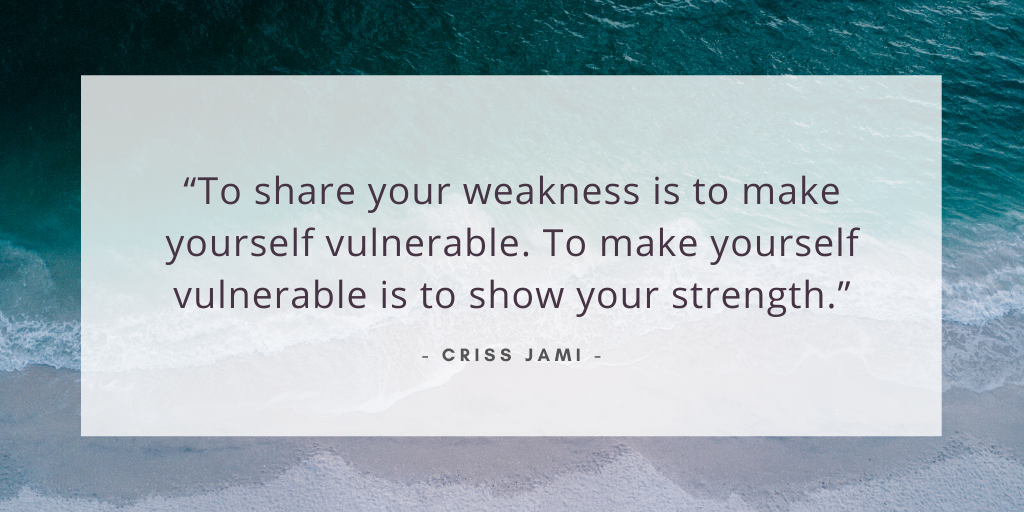“If you give a man a fish, you feed him for a day. If you teach a man to fish you feed him for a lifetime.”
I can’t help but relate this quote to our current work in student affairs and the huge role that vulnerability plays within it. Higher education, at its core, is based on interpersonal connections.
Mamta Accapadi, vice president for student affairs at Rollins College, recently wrote to her colleagues and friends:
“The truth is, I have good days and bad days. I have broken into tears many times, and I have cherished the laughter I have had with so many of you. I have always been inspired by our collaborative culture, and I am in awe to see us somehow practice an alchemy that has taken our collaboration into an even more magical place.”
The vulnerability exemplified by this quote made me feel an instant connection with Accapadi as it directly touched upon things I’ve felt throughout this pandemic. It made me feel like I wasn’t the only professional stumbling before I could catch my balance.
We must take note of Accapadi’s demonstration of raw emotion. It exemplifies exactly what we need to be role-modeling for our students, co-workers, and staff as we navigate these uncharted waters of remote working and learning. We need to be unafraid of being human with those we lead, unafraid to stumble and ask for a hand to steady ourselves.

Expressing authenticity and vulnerability could be the invitation that someone is waiting for — the green light for them to also admit that they’re struggling and to ask for help.
As supervisors and leaders, we often worry about oversharing or blurring relationship boundaries. These concerns are certainly worth keeping in mind, but showing vulnerability doesn’t have to mean abandoning the expectations and boundaries you’ve established. So, here are five tips on how to appropriately (and genuinely) express vulnerability as a leader.
1. Pull from your experiences, but don’t overshare
We all know what it feels like to open up to someone, only to have them shift the conversation to themself and their own experiences.
Commiserating is an understandably natural inclination to have. But, unfortunately, making the conversation all about yourself can invalidate the experience for the other person, discouraging them from wanting to share with you in the future.
This pattern can be extremely damaging to your relationship-building with students and coworkers. As leaders, pulling from our experiences’ through vulnerability helps us to be able to empathize with our students and staff. But going beyond that by sharing intimate details about our lives may make them feel uncomfortable.
If this phenomenon is hitting especially close to home, don’t fret. We’ve all been guilty of this at some point, and it doesn’t mean we can’t repair the relationship and continue the rapport we’ve built with that student.
2. Be authentic
What does authenticity even mean? To me, it means being genuine with your feelings.
If, for example, you make the mistake of oversharing with someone when you should have been listening and validating their own story, then you should apologize. Tell them that you are honored they opened up to you. Let them know that you didn’t intend to take anything away from their experiences by sharing your own.
Or if you’re feeling uncomfortable with a student crying in your office, let them know that you are there with them in that moment. Be present and listen; that’s often all someone in distress wants.
Apologizing for your mistakes doesn’t take away from your ability to lead. If anything, it emphasizes the importance of what it means to be a leader by demonstrating vulnerability.

3. Connect; don’t commiserate
Make sure not to misconstrue being vulnerable and making genuine connections with commiseration. You can (and should!) validate feelings and experiences without contributing to your students’ and co-workers’ frustrations, fears, and reasons for sadness.
If, for example, a student comes to you to talk about dropping a class due to how “awful” their professor is, you should do three things:
- Validate (“It sounds like this class has been tough on you this semester.”)
- Connect (“I remember a tough professor I had. They really pushed me outside of my comfort zone of what I was used to academically, and it was the first time I had to ask for help.”)
- Support (“Have you talked with your professor about your concern with your grades? What can I do to help?”)
You also need to avoid falling into the metaphorical “pit of pain” with them.
Imagine a pit in the ground. If you start feeling what your student or co-worker is feeling, then the hand you extend to them from above will pull you down in the pit with them.
Instead, your goal should be to stay at the top, on level ground, and extend your hand to pull them out, offering every resource and kindness you can provide.
It can be easy to feel hurt and sad when a student you’re close with or a coworker you respect is going through a tough time. Just remember that falling into that “pit of pain” can be detrimental to your own well-being and lead to compassion fatigue. It’s awfully tough to be a resource for others if we aren’t taking care of ourselves first.
Pro tip: Utilize your support network to talk about the tough situations you deal with in the workplace, including vulnerable conversations students pull you into. You can chat with your supervisor, coworkers, or even mental health practitioners.
I always talk with my supervisor after dealing with tough situations. Oftentimes, they’ve encountered similar experiences throughout their time in the field and have great insight and support to offer.
4. Share how you felt; don’t tell them how they should feel
Make sure you’re not telling anyone how they should feel. Rather, you can share how you felt when you were in a similar situation.
As leaders, it’s our responsibility not to take ownership away from our staff and students. Give people time to determine what it is they’re feeling and sit with them in silence as they process and reflect.
Silence can feel as though it’s meant to be filled but it’s important to let it remain vacant sometimes. Ask your student or co-worker what they need and how you can help. Validate that what they’re feeling is normal.
Oftentimes, when people share their struggles or challenges, they don’t want easy answers or pieces of advice; they just want to be heard.
5. Avoid suggesting a solution
For a lot of us (including myself), avoidance can be very difficult. Student affairs professionals tend to be solutions-focused. But, in these vulnerable and uncertain times, absolute “solutions” aren’t always possible.
We need to recognize that no singular thing alone can “fix” the feelings and fears our students and staff are facing during this pandemic. (And it’s okay to say your fears out loud; remember the tip about authenticity!).
The important thing is that you are meeting your students and coworkers where they are (metaphorically speaking) and recognizing that that place can change from day to day.
Be honest by sharing the difficulties you’ve experienced in working or taking classes remotely. Be realistic in not knowing what the next semester will hold for you or your students and acknowledge that that’s scary.
You can also talk about strategies to help students and co-workers to cope with that uncertainty — things we remind ourselves of when we are in a negative headspace and support networks we utilize when we are feeling hopeless or untethered.
I recently had an interaction with a student leader as we made the transition to one-on-one meetings over Zoom, and they reminded me of something similar to a point Accapadi touched on in her letter.
The student told me how tough it has been for them, as an active student leader, to not be on campus. They missed preparing their incoming executive board in the traditional way and connecting with their fellow student leaders in person. Then, they thanked me for showing them that it’s okay to express those feelings to their incoming board, just as I have expressed my emotions to them.
They told me how they’ve learned to share their authentic feelings with those they’re leading in a way that is inspiring and motivating. Hearing this reminded me that we get to choose how we react to situations and experiences and how we share that with those around us.

We get to choose how we show up, how much care we put into our daily interactions and the love we put into this world. If you’re interested in reading more about this, researcher and author Brene Brown talks a great deal about the power of vulnerability in a way that it’s highly relevant to our work.
Most of us are in student affairs because we want our students to be able to show up for themselves and others long after they graduate. We want them to be able to nourish the world with what they learned under our wings.
So, allow yourself to feel whatever it is you’re feeling; those feelings are more than valid. Remember to lead with vulnerability.
How have you led with vulnerability? We’d love to hear your stories. Connect with us on Twitter @themoderncampus and @treetray1.





